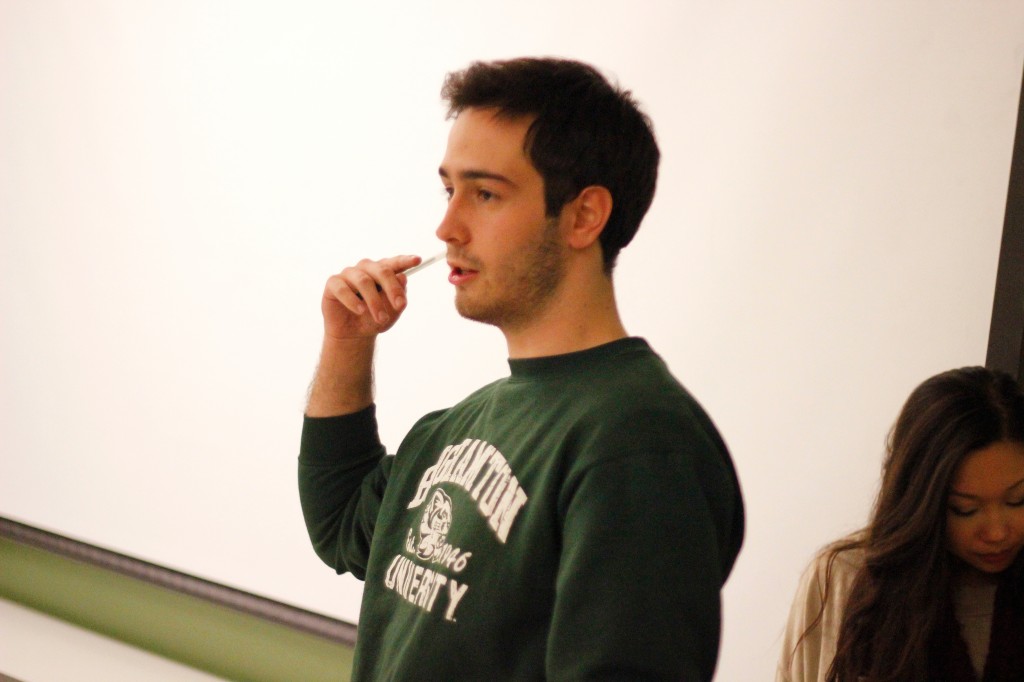
One of the most nerve-racking experiences in a new relationship can be the dreaded first time meeting the parents. Members of different cultural groups on campus sat down to find out how being from two different cultures can affect the situation.
As part of Black History Month, the Black Student Union (BSU), the Philippine-American League (PAL), Hillel at Binghamton and Powerful United Ladies Striving to Elevate (PULSE) coordinated and held “Guess Who’s Coming Home?” in the Old University Union. The event, which borrows its name from the 1967 film entitled “Guess Who’s Coming to Dinner,” dealt with relationships seen through the lenses of different cultures, ethnicities and religions.
The comedy focuses on a white female bringing home her black boyfriend to meet her parents.
Nathaniel Lancaster, the Student Association representative for BSU, said the group’s motivation for hosting the event with several different cultural student groups stemmed from a desire for unity.
“It unites different cultures and races, bringing them together through a topic of relationships,” said Lancaster, a senior majoring in political science.
The panel was split into discussions about two major aspects of relationships: differences between the female and male perceptions of dating, and bringing a partner of a different background to meet the parents.
The representatives for each group introduced each general topic with YouTube videos containing content from Wong Fu Productions, a channel dedicated to videos on relationships, as well as a scene from “Anchorman 2,” where Will Ferrell tries to fit in at his black girlfriend’s house.
The differences between various groups are arbitrary, according to Melinda Momplaisir, co-public relations coordinator of P.U.L.S.E.
“We want to show others that although we share different religions and races, we still all have similar customs,” said Momplaisir, a junior majoring in history.
The hosts posed the question of how different families would react to their children bringing home a girlfriend or boyfriend of a different culture, race or religion. Rafael Schulman, a member of the student group outreach team for Hillel and one of the hosts of the event, told the audience how his own family would react in a situation like that.
“They probably wouldn’t accept her if she wasn’t Jewish, regardless of how she looks,” said Schulman, a sophomore majoring in neuroscience.
The topic of religious dissonance drew the most participation from the audience, who shared personal stories and beliefs to illustrate the influence of religion on dating.
“I would probably date someone like me who isn’t very religious because that would be more comfortable,” said Samantha Pezzello, a junior double-majoring in studio art and German. “I’m not very religious but I wouldn’t convert to another religion for anyone.”
Jason Cruz, the educational chair of PAL and a co-host of the event, shared his story with the audience regarding the Roman-Catholic upbringing of his family and how intimate partners who did not partake in the faith were treated.
“My brother married a Chinese girl and she’s not very religious, which isn’t really a major issue with my mom, but she really wants her grandchildren to be raised Roman-Catholic,” said Cruz, a sophomore majoring in biology. “She actually went through the lengths of getting a book that our local parish was distributing to give to my sister-in-law. I guess that just goes to show how important it is that religion be passed on.”
Other topics included interracial dating and pre-marital sex, which students said depended heavily on their family’s culture and religion.
“I don’t think my parents would care,” said Julie Oh, a freshman majoring in accounting. “They would just trust me to do the right thing.”
The majority of the night consisted of a question-and-answer session involving representatives from the four host organizations and the audience of over 80 students.
“I think it’s cool that a lot of cultures can come together and talk about things like interracial dating,” said Aaron Chernin, a sophomore majoring in mathematics. “Communication is the first step to opening the bridge to even more issues.”


